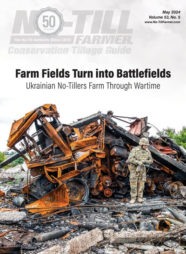By David Schiff
For the first time, a University of Wisconsin study has proven a crop-injuring Tospovirus can be passed from soybean seeds to plants, a finding with significant implications for soybean production around the world.
The study shows the virus can spread from an infected seed lot to seedlings at a rate of 6%, which affects seed quality and reduces total oil content. Until now, Tospovirus transmission in this manner was unproven and thought unlikely.
Unchecked, the virus — called Soybean vein necrosis virus (SVNV) — could reduce the production of high-quality, pathogen-free seed and soybean oil yields.
Armed with this new knowledge, soybean growers should work to preserve clean seed lots to help prevent SVNV damage in breeding nurseries and in the field. Further, University of Wisconsin plant pathologist Damon Smith urges seed producers to be diligent about scouting their crop and testing plants for SVNV so the virus is not transmitted to the next soybean generation.
Given the industry demand for high-oleic production, farmers should be aware that SVNV can reduce oil content in soybeans, so it’s prudent to source soybean seeds from producers who use vigilant SVNV-screening measures.
Smith points out there is no risk to animal or public health from Tospovirus, but reduced oil production can have a negative effect on farm profitability.
Further research will be needed to understand why this particular virus can be seed transmitted. Smith suspects there may be multiple strains of the SVNV virus.
Growers can read the entire study, "Seed Transmission of Soybean vein necrosis virus: The First Tospovirus Implicated in Seed Transmission," online.






Post a comment
Report Abusive Comment